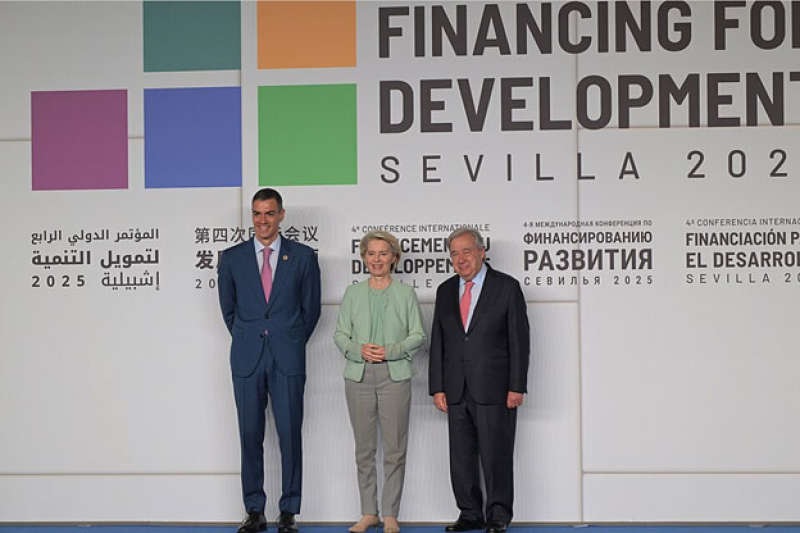- UNRWA Report on the Humanitarian Crisis in Gaza & West Bank |
- Rail link with Khulna cut off as train derails in Chuadanga |
- 3 killed, 10 injured in Pabna Bus-truck collision |
- UN Chief Appalled as Gaza Crisis Deepens, Aid Blocked |
- Dhaka’s air quality ‘moderate’ also on Friday morning |
FfD4 at Sevilla Plants the Seeds of Debtor Unity

Pedro Sánchez, Ursula Von der Leyen, António Guterres, from left to right, at the 4th International Conference on Financing for Development.
UN Member States adopted the Compromiso de Sevilla at the Fourth Financing for Development Forum (FfD4), which concluded on July 3—culminating months of contentious negotiations that pitted wealthy nations against the developing world in competing visions for reforming the global economic architecture.
The wide-ranging outcome document will be met with both fanfare—from host countries and UN officials eager to portray the process as a success—and criticism from civil society groups lamenting the dilution of material commitments into toothless words. Yet, buried in its 38 pages is a single paragraph that quietly plants the seed for a more transformative agenda:
“We will establish a platform for borrower countries with support from existing institutions, and a UN entity serving as its secretariat. The platform may be used to discuss technical issues, share information and experiences in addressing debt challenges, increase access to technical assistance and capacity building in debt management, coordinate approaches, and strengthen borrower countries’ voices in the global debt architecture.”
Uniting borrowing countries has long been a dream for those concerned with the imbalance of power in the global financial system. Creditors are already organised into collectives like the Paris Club, they argue, so debtors too should collaborate—perhaps even threatening a coordinated default—to gain negotiating leverage.
With two-thirds of low-income and a quarter of middle-income countries in or near debt distress, a united front could help obtain better restructuring terms during crises and push for long-term reforms to a system that perpetuates debt and underdevelopment.
But this is easier said than done.
Developing countries—and the economic elites who often govern them—remain deeply dependent on international finance and are hesitant to provoke financial markets. Overcoming such fears across multiple nations, each with its own interests, is a major challenge.
The FfD4 document carefully avoids terms like “debtors’ club” or explicit references to collective negotiation or default. Instead, it promotes more neutral forms of collaboration such as information sharing and capacity building. Still, even small steps toward cooperation can yield real results.
History offers precedent. In June 1984, eleven Latin American nations gathered in Cartagena, Colombia to coordinate responses to the regional debt crisis. The resulting Cartagena Consensus declared itself not a “debtors’ club,” but a forum for joint action. The group met five times over several years, forging common positions on crisis causes and solutions.
Though the Cartagena group never matured into a unified negotiating bloc, its mere existence had a meaningful impact. Shared principles shaped initial deals, improved terms for some countries, and created negotiating momentum.
As scholar Diana Tussie noted at the time:
“A significant improvement in the cost of negotiated credit was achieved: spreads were reduced, rescheduling fees were drastically reduced, the cost of loans fell, and amortisation periods increased significantly.”
Rhetorically, the Consensus shifted the narrative—from a moralistic focus on overspending to a political analysis of structural inequities and interest rate shocks from developed economies.
Today’s multilateral borrowers’ platform has several advantages. The current debt crisis, though widespread, is less acute than in 1984, allowing more time and flexibility to build institutional capacity. With UN support and participation from a broader set of global actors—including new bilateral creditors—the initiative may enhance the bargaining power of debtor nations.
Of course, the debt crisis is not just about restructuring. Systemic reform is essential—whether it’s passing laws to address creditor holdouts or creating a permanent multilateral sovereign debt workout mechanism, long demanded by debt relief advocates.
Yet such reforms have consistently been blocked by creditor resistance. Greater coordination among debtor countries may be the only way to break this impasse.
The commitment to establish a borrowers’ platform is neither a full-fledged debtors’ club nor a panacea. But in a document otherwise short on ambition, it represents a concrete move toward balancing unequal power dynamics—and a signal that debtor nations may not remain passive in the face of creditor inaction.
Michael Galant is Senior Research and Outreach Associate at the Center for Economic and Policy Research (cepr.net) in Washington, DC.

